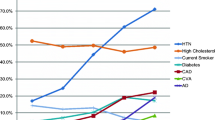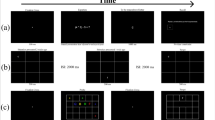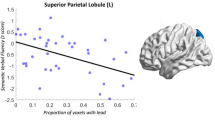Abstract
Cognitive impairment in depression may be one of the more practically important aspects of the illness, responsible for much of its morbidity. It also is at the heart of its psychopathology, may contribute to strategies of treatment, and may give us a more easily quantifiable measure of impaired function to correlate with brain activity. Functional magnetic resonance imaging (fMRI) is ideally suited to examine brain function in depression. It has the correct time window to repeatedly sample cognitive task performance; it does not require exposure to radioactive tracers and can therefore be repeated many times; it also can be linked with high resolution structural images acquired in the same imaging session that help identify the regions of activation and support the spatial transformation necessary to compare the scans of different subjects. fMRI has already produced a series of consistent results in depression, identifying increased activity of rostral anterior cingulate and other medial prefrontal structures during effortful tasks and on occasion also increased dorsolateral prefrontal activity, suggesting increased possibly compensatory activity to maintain task performance. Investigating the interplay between limbic (orbitomedial) and ‘cognitive’ dorsolateral structures clearly has the potential to clarify important illness mechanisms of depressive illness.
Similar content being viewed by others
References
Airaksinen E, M Larsson, I Lundberg and Y Forsell (2004) Cognitive functions in depressive disorders: evidence from a population-based study.Psychol. Med. 34, 83–91.
American Psychiatric Association (1994)Diagnostic and Statistical Manual of Mental Disorders, 4th Ed. (American Psychiatric Association:Washington DC).
Austin MP, P Mitchell and GM Goodwin (2001) Cognitive deficits in depression: possible implications for functional neuropathology.Br. J. Psychiatry 178, 200–206.
Beauregard M, JM Leroux, S Bergman, Y Arzoumanian, G Beaudoin, P Bourgouin and E Stip (1998) The functional neuroanatomy of major depression: an fMRI study using an emotional activation paradigm.Neuroreport 9, 3253–3258.
Berns GS, SM McClure, G Pagnoni and PR Montague (2001) Predictability modulates human brain response to reward.J. Neurosci. 21, 2793–2798.
Casey BJ, JD Cohen, K O’Craven, RJ Davidson, W Irwin, CA Nelson, DC Noll, X Hu, MJ Lowe, BR Rosen, CL Truwitt and PA Turski (1998) Reproducibility of fMRI results across four institutions using a spatial working memory task.Neuroimage 8, 249–261.
Davidson RJ, W Irwin, MJ Anderle and NH Kalin (2003) The neural substrates of affective processing in depressed patients treated with venlafaxine.Am. J. Psychiatry 160, 64–75.
Drevets WC (2000a) Functional anatomical abnormalities in limbic and prefrontal cortical structures in major depression. In:Progress in Brain Research (Uylings HBM, CG Van Eden, JPC De Bruinet al., Eds.) (Elsevier Science:London).
Drevets WC (2000b) Neuroimaging studies of mood disorders.Biol. Psychiatry 48, 813–829.
Ebert D and KP Ebmeier (1996) The role of the cingulate gyrus in depression: from functional anatomy to neurochemistry.Biol. Psychiatry 39, 1044–1050.
Ebmeier KP and D Kronhaus (2002) Brain imaging and mood disorders, In:Biological Psychiatry (D’haenen H, JA den Boer and P Willner, Eds.) (John Wiley & Sons:London).
Elliott R, BJ Sahakian, JJ Herrod, TW Robbins and ES Paykel (1997) Abnormal response to negative feedback in unipolar depression: evidence for a diagnosis specific impairment.J. Neurol. Neurosurg. Psychiatry 63, 74–82.
Elliott R, KJ Friston and RJ Dolan (2000) Dissociable neural responses in human reward systems.J. Neurosci. 20, 6159–6165.
Elliott R, JS Rubinsztein, BJ Sahakian and RJ Dolan (2002) The neural basis of mood-congruent processing biases in depression.Arch. Gen. Psychiatry 59, 597–604.
Fossati P, F Coyette, AM Ergis and JF Allilaire (2002) Influence of age and executive functioning on verbal memory of inpatients with depression.J. Affect. Disord. 68, 261–271.
Fossati P, PO Harvey, G Le Bastard, AM Ergis, R Jouvent and JF Allilaire (2004) Verbal memory performance of patients with a first depressive episode and patients with unipolar and bipolar recurrent depression.J. Psychiatr. Res. 38, 137–144.
Fuster JM (1997)The Prefrontal Cortex (Lippincott-Raven:New York, NY).
Harvey PO, G Le Bastard, JB Pochon, R Levy, JF Allilaire, B Dubois and P Fossati (2004) Executive functions and updating of the contents of working memory in unipolar depression.J. Psychiatr. Res. 38, 567–576.
Harvey PO, P Fossati, JB Pochon, R Levy, G Lebastard, S Lehericy, JF Allilaire, and B Dubois (2005) Cognitive control and brain resources in major depression: an fMRI study using the n-back task.Neuroimage 26, 860–869.
Holmes AJ, A MacDonald 3rd, CS Carter, DM Barch, V Andrew Stenger and JD Cohen (2005) Prefrontal functioning during context processing in schizophrenia and major depression: an event-related fMRI study.Schizophr. Res. 76, 199–206.
Hooley JM, SA Gruber, LA Scott, JB Hiller and DA Yurgelun-Todd (2005) Activation in dorsolateral prefrontal cortex in response to maternal criticism and praise in recovered depressed and healthy control participants.Biol Psychiatry 57, 809–812.
Hugdahl K, BR Rund, A Lund, A Asbjornsen, J Egeland, L Ersland, NI Landro, A Roness, KI Stordal, K Sundet and T Thomsen (2004) Brain activation measured with fMRI during a mental arithmetic task in schizophrenia and major depression.Am. J. Psychiatry 161, 286–293.
Ilsley JE, AP Moffoot and RE O’Carroll (1995) An analysis of memory dysfunction in major depression.J. Affect. Disord. 35, 1–9.
Kessler RC, P Berglund, O Demler, R Jin, D Koretz, KR Merikangas, AJ Rush, EE Walters and PS Wang (2003) The epidemiology of major depressive disorder: results from the National Comorbidity Survey Replication (NCS-R).JAMA 289, 3095–3105.
Mayberg HS (2003) Modulating dysfunctional limbic-cortical circuits in depression: towards development of brain-based algorithms for diagnosis and optimised treatment, In:Imaging Neuroscience: Clinical Frontiers for Diagnosis and Management (Frackowiak RS and T Jones, Eds.) (Oxford University Press: Oxford), pp 193–207.
Mayberg HS, SK Brannan, RK Mahurin, PA Jerabek, JS Brickman, JL Tekell, JA Silva, S McGinnis, TG Glass, CC Martin and PT Fox (1997) Cingulate function in depression: a potential predictor of treatment response.Neuroreport 8, 1057–1061.
Mayberg HS, AM Lozano, V Voon, HE McNeely, D Seminowicz, C Hamani, JM Schwalb and SH Kennedy (2005) Deep brain stimulation for treatment-resistant depression.Neuron 45, 651–660.
McClure SM, MK York and PR Montague (2004) The neural substrates of reward processing in humans: the modern role of fMRI.Neuroscientist 10, 260–268.
Murphy FC, A Michael, TW Robbins and BJ Sahakian (2003) Neuropsychological impairment in patients with major depressive disorder: the effects of feedback on task performance.Psychol. Med. 33, 455–467.
Murray CJL and ADE Lopez (1996)Global Burden of Disase (Harvard University Press:Boston).
Pochon JB, R Levy, P Fossati, S Lehericy, JB Poline, B Pillon, D Le Bihan and B Dubois (2002) The neural system that bridges reward and cognition in humans: an fMRI study.Proc. Natl. Acad. Sci. USA 99, 5669–5674.
Porter RJ, P Gallagher, JM Thompson and AH Young (2003) Neurocognitive impairment in drug-free patients with major depressive disorder.Br. J. Psychiatry 182, 214–220.
Rolls ET (1999)The Brain and Emotion (Oxford University Press: Oxford).
Rose EJ, E Simonotto and KP Ebmeier. Limbic over-activity in depression is associated with impaired working memory during the n-back task.Neuroimage, under review. Rose EJ, E Simonotto and KP Ebmeier, Rose EJ, E Simonotto and KP Ebmeier (2006) Limbic over-activity in depression during preserved performance on the n-back task.Neuroimage 29, 203–215.Epub 2005 Sep 12.
Shah PJ, KP Ebmeier, MF Glabus and GM Goodwin (1998) Cortical grey matter reductions associated with treatment-resistant chronic unipolar depression. Controlled magnetic resonance imaging study.Br. J. Psychiatry 172, 527–532.
Sheline YI, DM Barch, JM Donnelly, JM Ollinger, AZ Snyder and MA Mintun (2001) Increased amygdala response to masked emotional faces in depressed subjects resolves with antidepressant treatment: an fMRI study.Biol. Psychiatry 50, 651–658.
Siegle GJ, SR Steinhauer, ME Thase, VA Stenger and CS Carter (2002) Can’t shake that feeling: event-related fMRI assessment of sustained amygdala activity in response to emotional information in depressed individuals.Biol. Psychiatry 51, 693–707.
Steele JD and SM Lawrie (2004a) Neuroimaging, In:Edinburgh Companion to Psychiatric Studies (Johnstone EC and SM Lawrie, Eds.) (Churchill Livingstone:Edinburgh).
Steele JD and SM Lawrie (2004b) Segregation of cognitive and emotional function in the prefrontal cortex: a stereotactic meta-analysis.Neuroimage 21, 868–875.
Steele JD, M Meyer and KP Ebmeier (2004) Neural predictive error signal correlates with depressive illness severity in a game paradigm.Neuroimage 23, 269–280.
Steele JD, J Currie, SM Lawrie and IC Reid (2005) Prefrontal cortical functional abnormality in major depressive disorder: a stereotactic meta-analysis. (submitted for publication).
Sweeney JA, JA Kmiec and DJ Kupfer (2000) Neuropsychologic impairments in bipolar and unipolar mood disorders on the CANTAB neurocognitive battery.Biol. Psychiatry 48, 674–684.
Vogt BA, DM Finch and CR Olson (1992) Functional heterogeneity in cingulate cortex: the anterior executive and posterior evaluative regions.Cereb. Cortex 2, 435–443.
Vollm B, P Richardson, S McKie, R Elliott, JF Deakin and IM Anderson (2006) Serotonergic modulation of neuronal responses to behavioural inhibition and reinforcing stimuli: an fMRI study in healthy volunteers.Eur. J. Neurosci. 23, 552–560.
Wagner G, E Sinsel, T Sobanski, S Kohler, V Marinou, HJ Mentzel, H Sauer and RG Schlosser (2006) Cortical inefficiency in patients with unipolar depression: an event-related fMRI study with the Stroop task.Biol Psychiatry 59(10), 958–965. E-pub Feb. 3.
Author information
Authors and Affiliations
Corresponding author
Rights and permissions
About this article
Cite this article
Ebmeier, K., Rose, E. & Steele, D. Cognitive impairment and fMRI in major depression. neurotox res 10, 87–92 (2006). https://doi.org/10.1007/BF03033237
Received:
Revised:
Issue Date:
DOI: https://doi.org/10.1007/BF03033237




